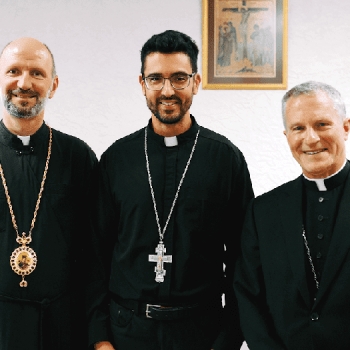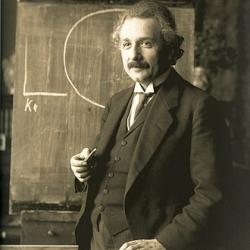Editor's Note: Below is a "Monday Sermon," from our series of sermons at the Patheos Preachers Portal that pastors can enjoy and learn from. It is our hope that this particular series from Daniel Harrell, which preaches through the Church Fathers, will encourage pastors, show them a way of approaching theological education from the pulpit, and refresh their theological memories. See Reverend Harrell's columnist page for more information.
Gregory of Nyssa, along with his brother Basil the Great and their friend Gregory of Nazianzus, together comprised the 4th-century church leaders known to us as the Cappadocian Fathers. They are credited with defending orthodox Christianity from various heretical challenges as they fought to formulate the definitive Nicene Creed. Fourth-century Asia Minor was a tumultuous place during a tumultuous time in church history when all of the doctrines we take now for granted were then up for grabs. The nature of the Trinity, the divinity and humanity of Jesus, the contents of the Bible, the role of the Holy Spirit—all of these were debated publicly in the streets with even fiercer fervor than states now debate gay marriage, fiscal policy, and road construction combined.
Into this fray stepped Basil the Great, so named due to his fierce convictions and his readiness to take on the chief heresy of Arianism—basically the 4th-century's version of The Da Vinci Code. Arians held that no man, not even Jesus, could ever be God. Arians believed Jesus to be the highest created being, but he was still just a creature and not the Creator. Gregory of Nazianzus, credited with defeating the Arians, had not been as ready and willing as Basil to join the battle. He only did so because Basil died without finishing the fight.
Basil's brother, Gregory of Nyssa, was even more reluctant than Gregory of Nazianzus to get involved. He preferred instead to settle down in Caesarea with his wife and pursue a career as a professional orator. However, big brother Basil would tolerate none of Gregory's complacency. Now Bishop of Constantinople, Basil ordered Gregory to take over the diocese of Nyssa and secure it for orthodoxy, reminding him that to believe in God was to acknowledge God's right to demand your very life. Death was often the outcome when it came to church jobs in ancient Turkey. Reports abound of ministers fleeing ecclesiastical assignments for fear of losing their lives, only to have church committees then track down the runaway ministers and drag them back into service—all of which gives different meaning to the concept of "feeling called to the ministry." Whether this happened with Gregory is unknown, but what is known is that he stunk as a pastor. In fact, he got along so badly with his congregation that they falsely accused him of embezzling church funds just so they could get rid of him.
However this turned out to be an ironic blessing, as most of God's blessings are. Getting fired from his ministerial duties freed Gregory to write an enormous number of theological treatises that heavily influenced church doctrine regarding the infinite nature of God, the Trinity, the deity and incarnation of Jesus as well as the believer's relationship with Christ. It is in this last area, our relationship with Christ, where Gregory is best remembered. He wrote,
If we put on the name of Christ but do not demonstrate through our life what is meant by this name, we betray the model that was given to us, akin to putting on a lifeless mask that gives human character to a monkey. It is not the nature of Christ to be anything other than righteousness, purity, truth, and alien to every evil. Therefore, if one wishes to define the meaning of Christianity, we shall say it this way: Christianity is the imitation of Christ.
Of course, Gregory of Nyssa knew better than anybody that while imitating Christ may be the meaning of Christianity, that does not mean it's an easy thing to do. All of us constantly find ourselves in those places where we know what imitating Christ looks like—turning the other cheek when offended, going the extra mile for someone who needs our help, taking care of the plank in our own eye before going after the speck in somebody else's; we know what's right, we just don't do it. Of course this makes us feel guilty for being such bad Christians, but the fact of the matter is that most days that's we are. Is it any wonder that Gregory of Nyssa's favorite verse came from Philippians 3? The apostle Paul wrote: "I'm not yet perfect, I don't have it all together, I'm doing my best, I keep trying, I'm pressing on." Paul declares himself the virtual equivalent of a "work in progress." And all God's people breathe a collective sigh of relief. If even St. Paul's no saint, maybe I'm okay too.





